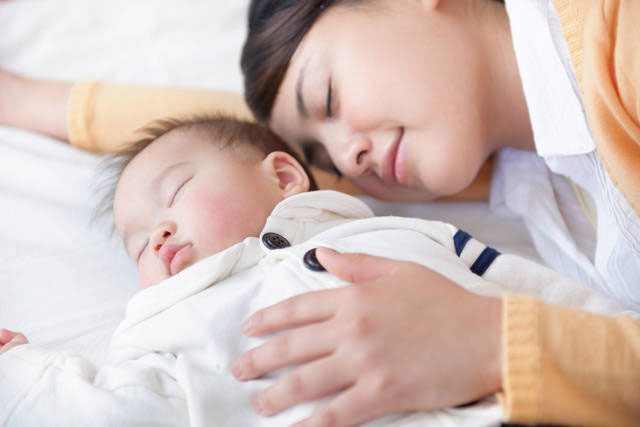When children are young, sleeping next to someone will create a sense of closeness with that person as they grow up. This naturally has a significant impact on the child’s future.
Sleeping with Mother is Best
When children are still in the womb, they feel absolute safety. After birth, they regain this sense of security with their mother through hugs and caresses.
Therefore, the process of a mother accompanying her child during sleep is the best time to strengthen the mother-child bond. This can help children fully enjoy happiness, eliminate loneliness, and reduce feelings of insecurity.

After birth, children regain this sense of security with their mother through hugs.
This sense of safety is crucial for a child’s future development. If a child grows up feeling secure, they will be confident and have good communication skills.
Conversely, if children do not sleep with their mothers from a young age and instead sleep with their grandparents, they may gradually feel less close to their parents. There is a significant generational gap between grandparents and grandchildren, and they are often not skilled at expressing emotions and affection. As a result, children may become withdrawn, quiet, and often feel a persistent loneliness.
Children who frequently feel anxious or insecure may exhibit the following behaviors:
- Clinging to close family members, following them everywhere, and crying when separated.
- Holding onto the clothing of others tightly while sleeping, occasionally feeling as if someone is near them.
- Hiding behind adults when encountering strangers.
- Struggling to socialize in groups, often standing aside and watching others play.
Sleeping with Grandparents Affects Cognitive Development
Older adults often have deteriorating respiratory systems and physical functions. They breathe faster, require more oxygen, and emit more waste gases. If children frequently sleep next to older adults, they will inhale more waste gases, which can affect their physical development.

Children who frequently sleep next to older adults inhale more waste gases.
Additionally, although older adults may bathe regularly, their bodies still have a distinctive odor. This odor is actually caused by diacetyl. The skin of older adults is often rough and prone to flaking, which allows bacteria and pests to thrive on the oily residue of their skin. When young children come into contact with this flaky skin, bacteria can be transmitted, leading to symptoms such as hives, itching, and discomfort.
Older adults often have difficulty sleeping, waking up multiple times during the night and rising early, which can significantly impact the quality of sleep and cognitive development in children.
However, if sleeping with the mother, the child’s head should not be positioned too close to the mother’s head.
When Should Children Sleep Alone?
Many parents want to sleep with their children longer, but due to life circumstances, they are forced to have their children sleep alone early. Indeed, the decision to have children sleep in their own room is a matter that causes many parents to worry.
In reality, parents need to understand that the decision for children to sleep alone does not depend on a fixed age but rather on whether the timing is appropriate. Parents should only allow children to sleep alone between the ages of 3 and 10.
When children are younger, they tend to depend more on their mothers and feel secure only when sleeping next to them. If children experience any unusual situations, such as improper sleeping positions, mothers can detect and adjust them in time to prevent choking accidents.
Allowing children to sleep alone at a very young age can lead to feelings of insecurity, making it easier for them to develop bad sleeping habits, such as kicking off the covers, which is not beneficial for their mental and physical health.
Many parents believe that children need to sleep alone early to foster independence. However, in reality, there is no necessary correlation between “sleeping alone” and “independence.”
Parents should not underestimate the time spent with their children. By frequently being around their parents, children will have a happier and more positive outlook on life.


















































